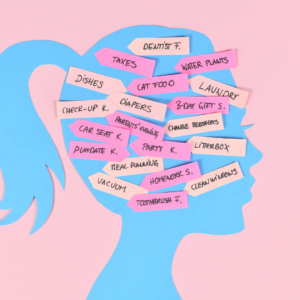Have you ever noticed how one critical comment can overshadow a dozen compliments? Or how a tough day can linger in your mind, no matter how many good ones came before it? If so, you’re not alone. As humans, we’re wired to focus on the negative – it’s part of how our brains evolved to protect us.
For single mums navigating the challenges of life after separation or divorce, this negativity bias can feel especially heavy. Difficult experiences – an argument with your ex, a judgmental comment from a family member, or your own self-doubt – can weigh far more than the positives in your day.
But understanding why negative experiences hold so much power can help you regain control. By reframing your mindset and creating intentional strategies, you can start to tip the balance in your favour.

The Science Behind the Negativity Bias
Our brains are naturally more attuned to negative experiences than positive ones. This is an evolutionary trait: our ancestors needed to focus on potential threats – like predators or dangerous situations – to survive.
In modern life, however, this hardwiring doesn’t always serve us. The negativity bias can make us:
- Overanalyse criticism: One negative comment can echo louder than a hundred affirmations.
- Focus on failures: Small setbacks can feel insurmountable, even when we’re making significant progress overall.
- Discount positives: We might dismiss or downplay positive experiences, seeing them as “not enough.”
As a single mum, this bias can magnify feelings of guilt, stress, or self-doubt, making it harder to celebrate the wins – big or small – that you achieve every day.

How Negative Experiences Impact Your Mind and Body
Almost everyone remembers negative things more strongly and in more detail. The brain handles positive and negative information in different ways. Negative emotions generally involve more thinking, and the information is processed more thoroughly than positive ones. That’s why we tend to ruminate more about the bad things that happen and we use stronger words to describe them.
It’s the same with criticism and praise. When someone says something bad to you, you really remember it. Like when someone bullies you in primary school – all the harsh things and actions they did to you are etched in your memory.
Negative experiences don’t just affect your mood; they can have real consequences for your overall well-being.
- Emotional toll: Dwelling on negative events can lead to heightened anxiety, stress, or feelings of inadequacy.
- Physical stress: Constantly focusing on challenges can trigger your body’s fight-or-flight response, increasing cortisol levels and leading to fatigue or health issues.
- Relationship strain: When negativity dominates your thoughts, it can affect how you connect with your kids, co-parent, or interact with friends and family.
Acknowledging these effects is the first step in creating change.

Why Positive Experiences Struggle to Stick
While negative events hit us immediately and deeply, positive ones require more effort to “stick” in our memory. Think of positivity as needing time to take root, while negativity seems to cement itself instantly.
That’s why it’s so important to intentionally seek out, savour, and reflect on positive moments. This practice doesn’t come naturally to most of us, but with effort, you can rewire your brain to hold onto the good.
How to Shift the Balance
Though we can’t eliminate negative experiences, we can change how much power they hold over us. Here’s how:

1. Practice gratitude
Focus on what’s going well in your life. Each evening, jot down three things you’re grateful for, no matter how small. Over time, this rewires your brain to notice and appreciate the positives.
2. Savour the good
When something positive happens, take a moment to truly absorb it. Whether it’s a hug from your child, a compliment from a friend, or simply a peaceful moment, feel it, and let it sink in for 15-30 seconds.
3. Reframe the negative
When faced with a negative experience, ask yourself: “What can I learn from this? How can I grow?” Shifting your perspective helps reduce its emotional weight.
4. Create positive anchors
Surround yourself with reminders of joy – photos, uplifting quotes, or mementos that bring a smile to your face. These anchors can help ground you during tough moments.
5. Seek support
Talking about your struggles with someone you trust – a friend, therapist, or coach – can help you process negative experiences and gain perspective.
6. Celebrate small wins
Don’t wait for big milestones to celebrate. Did you get the kids to school on time? Handle a tough conversation with your ex calmly? Celebrate those moments – they matter.

Remember: You’re in Control
While it’s natural for negative experiences to hit harder, they don’t have to define your story. By actively focusing on the positives and reframing your perspective, you can regain balance and build resilience.
As a single mum, you’re already doing one of the hardest jobs out there – and you’re doing it with strength, courage, and love. The next time a negative experience tries to take over, remind yourself of all the good you’re creating in your life and the lives of your children.
You’re not just surviving; you’re thriving – and that’s something to celebrate.
Take a deep breath. Focus on the good. And remember: you’ve got this.
P.S. DID YOU KNOW?
Thrive Tribe – the global membership experience for single mothers – will be opening again very soon! Join the waitlist here.
PLUS You can book one-on-one coaching with Julia Hasche from wherever you are in the world!
- Do you need clarity on whether you should leave your partner or not?
- Have you just parted ways with your partner, and feeling lost?
- Have you been single for a little while now and need assistance with getting your life back on track and feeling empowered?
Click HERE to read about coaching and to hear from some others who have gone through coaching programs with Julia, and book in here for your 30-minute complimentary Clarity Call.
The purpose of the Clarity Call is:
- For me to get to know you and understand an overview of your current situation and where you are at.
- For us to establish what you need assistance with to move forward.
- To see if we are both comfortable working together.

Know someone who needs to read this? Share it with them via the links below.
